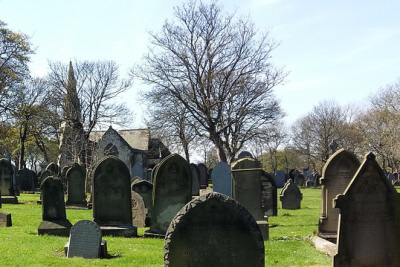
Victory in Death: Narrative of the Death of Thomas Halyburton
When he was still young, Thomas Halyburton’s family moved from Scotland in 1685 to avoid a bloody persecution, started by the British king, against all who did not attend the established church. These ‘covenanters’ were guilty of the ‘crime’ of worshipping the Lord in the open air, without an official church ‘permit.’
As a young man, Thomas received a good education, back in his native Scotland, but wrestled for some time with the philosophy of Deism, the idea that God has left the world to take care of itself. Eventually he rejected this unbiblical view and returned to the Christian faith.
He was ordained to the ministry and taught as a professor of divinity in St. Andrews, Scotland, but God saw fit to take his servant to eternal joy sooner than most; when he was 37, he was seized with illness, and realized that his death was coming shortly.
Several of his friends came to visit him, and he exhorted them “to faithfulness in the Lord’s work. You will never repent this. He is a good master. I have always found him so. If I had a thousand lives, I should think all too little to be employed in his service.”
“O,” he cried, “the thoughts of an incarnate God are sweet and ravishing! And, O! how do I wonder at myself, that I do not love him more! That I do not admire him more! O that I could honor him! What a wonder that I enjoy such composure under these pains, and in view of approaching death!”
He had no doubt what he was going to experience after death. “I shall see my Redeemer stand on the earth at the last day. But before then, I shall see the Lamb in the midst of the throne. O, it will be a glorious company, the spirits of just men made perfect, and Jesus the Mediator of the New Covenant! O, for grace! Grace to be patient to the end!”
To his little daughter he said, “Mady, my dear, the Lord bless you; the God of your father, and of my father, bless you; the God that fed me all my life; the angel that redeemed me from all evil, bless you, and the rest, and be your portion; that is a good heritage, better than if I had crowns and scepters to leave you. My child, I received you from him, and I will give you to him again.”
He urged his apothecary, “Study religion in youth; when you come to be as I am, you will find no comfort without it.”
Someone had urged him to be quiet and rest, but he said, “How should a man bestow his last breath, but in commending the Lord Jesus Christ, God clothed in our nature, dying for our sins!”
He noticed that his eyes were dimming, and there was sweat on his face. “This growing weakness of my eyes,” he said, “is a sign of a change approaching…But I shall behold him in righteousness, and when I awake, I shall be satisfied with his likeness!”
“Here is a demonstration of religion,” he said, “that I, a poor, weak, timorous man, once as much afraid of death as any, I that have been many years under the terror of death, come now, in the mercy of God and by the power of his grace, composedly and with joy to look death in the face. I have seen it in its paleness, and in all its circumstances of horror.”
How touchingly and tenderly he spoke to his wife: “O my sweet bird, are you there? I am no more yours. I am the Lord’s. I remember on the day I took you by the hand, I thought on parting with you. But I knew not how to get my heart off you again: yet now I have got it done. Will you not give me to the Lord, my dear?”
He noticed that she was very sad, and he said, “My dear, do not weep: you should rather rejoice: rejoice with me, and let us exalt his name together. I shall be in the same family with you: but you must stay a little behind, and take care of God’s children.”
Later he encouraged her again, “O, wait upon him; for he is a God to all that serve him. He never takes anything from them, but he gives them as good or better back again. My dear, we have had many a sweet day together: we must part for a while, but we shall meet again, and shall have one work, the praises of God, and the praises of the Lamb!”
“I could not believe that I could have borne, and borne cheerfully this rod so long. This is a miracle, pain without pain. Blessed be God that ever I was born. I have a father, a mother, and ten brothers and sisters in heaven, and I shall be the eleventh.”
Finally, in his last hours, a friend said to him, “Now you are putting your seal to that truth, that godliness is great gain.” And then, ‘about seven in the morning, he went to the land, where the weary are at rest.’



